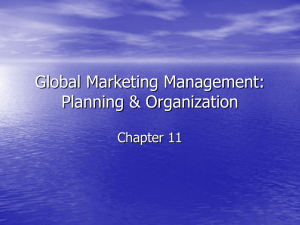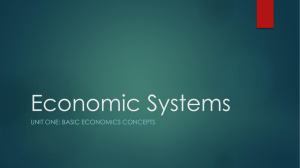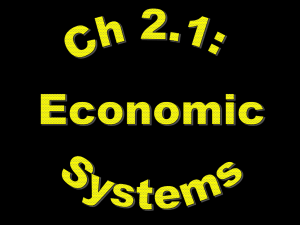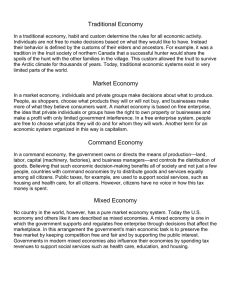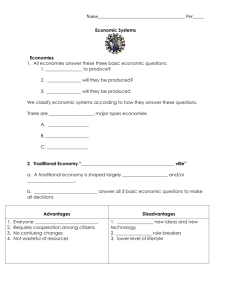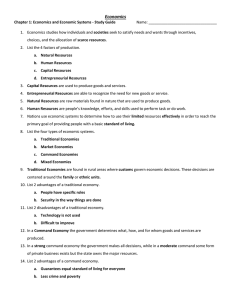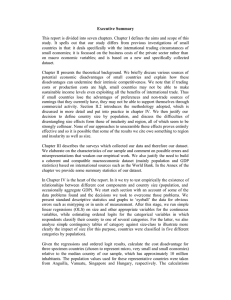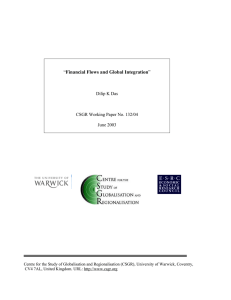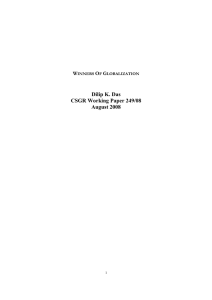Types of Economic Systems
advertisement
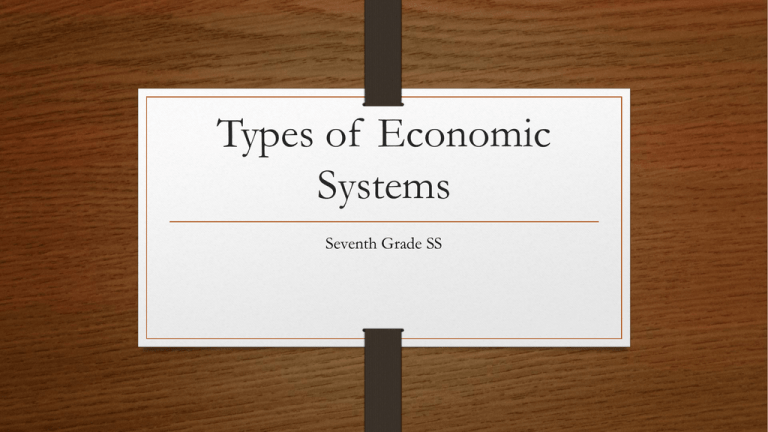
Types of Economic Systems Seventh Grade SS Three Economic Questions •What are we producing? •How are we producing it? •Who are we producing it for? Definitions • A system of production and exchange of goods and services as well as allocation of resources in a society. Traditional Economy • A traditional economic system is the best place to start because it is, quite literally, the most traditional and ancient type of economy in the world. There are certain elements of a traditional economy that those in more advanced economies, such as Mixed. Traditional Economy (WHERE) • Traditional economies still produce products and services that are a direct result of their beliefs, customs, traditions, religions, etc. Vast portions of the world still function under a traditional economic system. These areas tend to be rural, second- or third-world, and closely tied to the land, usually through farming. However, there is an increasingly small population of nomadic peoples, and while their economies are certainly traditional, they often interact with other economies in order to sell, trade, barter, etc. Learn about the complexities of globalization and how it shapes economic relationships and affects cultures with this great class on the geography of globalization. TRADITIONAL Economy (Advantages) • Certainly one of the most obvious advantages is that tradition and custom is preserved while it is virtually non-existant in market/mixed economies. • There is also the fact that each member of a traditional economy has a more specific and pronounced role, and these societies are often very close-knit and socially satisfied. Traditional Economy (Disadvantages) • The main disadvantage is that traditional economies do not enjoy the things other economies take for granted: Western medicine, centralized utilities, technology, etc. • But as anyone in America can attest, these things do not guarantee happiness, peace, social or, most ironically of all, economic stability. Market Economy • A market economy is very similar to a free market. • The government does not control vital resources, valuable goods or any other major segment of the economy. • In this way, organizations run by the people determine how the economy runs, how supply is generated, what demands are necessary, etc. Market Economy • No truly free market economy exists in the world. For example, while America is a capitalist nation, our government still regulates (or attempts to regulate) fair trade, government programs, moral business, monopolies, etc. • The advantage to capitalism is you can have an explosive economy that is very well controlled and relatively safe. • This would be contrasted to socialism, in which the government (like a command economy) controls and owns the most profitable and vital industries but allows the rest of the market to operate freely. • Price is allowed to fluctuate freely based on supply and demand Market Economy (Disadvantages) • Without gov’t involvement, consumers can be exploited. • This systems leads to a greater inequality with the rich getting richer, and the poor getting poorer. • Pollution is associated with this system due to higher levels of industrialization. • Over consumption of goods. Command Economy Centrally controlled economy ran by government • In terms of economic advancement, the command economic system is the next step up from a traditional economy. This by no means indicates that it is fairer or an exact improvement; there are many things fundamentally wrong with a command economy. • The most notable feature of a command economy is that a large part of the economic system is controlled by a centralized power; often, a federal government. This kind of economy tends to develop when a country finds itself in possession of a very large amount of valuable resource(s). The government then steps in and regulates the resources. Often the government will own everything involved in the industrial process, from the equipment to the facilities Command Economy (Advantages) • First of all, a command economy is capable of creating a healthy supply of its own resources and it generally rewards its own people with affordable prices (but because it is ultimately regulated by the government, it is ultimately priced by the government). • There is often no shortage of jobs as the government functions similarly to a market economy in that it wants to grow and grow upon its population. • Wasteful competition is avoided. Command Economy (Disadvantages) • No freedom of choice for consumers or producers. • Lack of incentives for workers result in low morale or efficiency. • Conflicts of interest can arise because what a county needs may not be what the people want. Mixed Economy • Economic system that incorporates some government involvement into a Market based economy. Mixed Economy (Advantages) • The gov’t can intervene in areas of the economy through the passing of laws to protect citizens from unfair trading practices. • The gov’t and the private sector can cooperate in offering certain services (transportation, health care, education). • Mixed Economy (Disadvantages) • Inequitable distribution of wealth can occur. • State-owned industries are allowed to operate inefficiently, wasting resources. • Since the private sector helps answer the economic questions- monopolies can occur.

